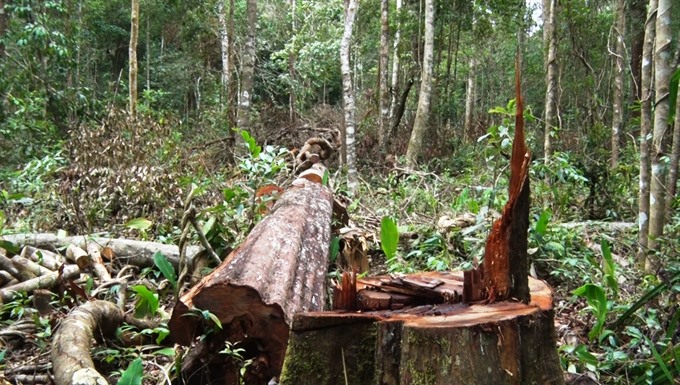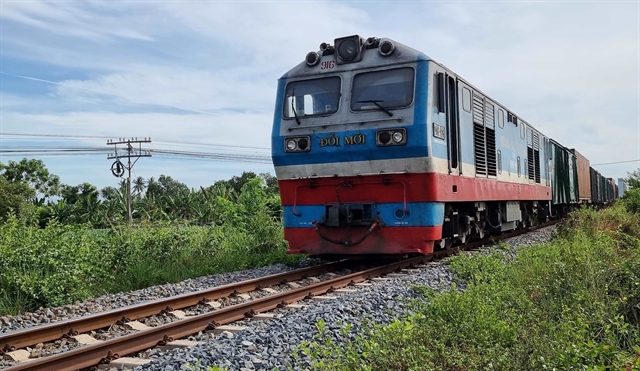.jpg) Society
Society

Rampant deforestation in the Central Highlands left to fester for many years by forestry authorities’ negligence has cost the region hundreds of thousands of hectares of forest, according to the Central Highlands Steering Committee. As a result, the Government recently decided to dissolve six companies it had assigned to protect the forests.
 |
| Illegally tree chopping in Nâm N’Jang Commune, Đắk Song District in the Central Highlands province of Đắk Nông. Rampant deforestation in the Central Highlands left to fester in many years by forestry authorities’ negligence has destroyed hundreds of thousands of hectares of forests. — VNA/VNS Photo Hưng Thịnh |
ĐẮK NÔNG — Rampant deforestation in the Central Highlands left to fester for many years by forestry authorities’ negligence has cost the region hundreds of thousands of hectares of forest, according to the Central Highlands Steering Committee. As a result, the Government recently decided to dissolve six companies it had assigned to protect the forests.
Specifically, recent inspections conducted by the Committee showed that 209,993ha of forest – 29.32 per cent of the total assigned area – have disappeared under the watch of commune-level people’s committees.
State-owned forestry companies and forest management boards kept silent over this significant loss, and only when the inspectors came to investigate, did it become known that vast tracts of forestland had for long existed solely on paper.
’Obdurate’ poachers
A land encroachment in Tuy Đức District of Đắk Nông Province is a case in point.
Phạm Hoà Dũng, Director of the South Central Highlands Co Ltd in Tuy Đức District said there are currently 30 “obdurate” people refusing to move from a forest area in Quảng Trực Commune. Dũng said they had set up camp and have been clearing the forest for agricultural purposes since last year’s November.
Understaffed forestry authorities failed to dislodge the group and the resulting loss of forest has reached 16.3ha, Dũng told Nông thôn ngày nay (Rural Today) newspaper.
Last June, Tuy Đức and Bù Gia Mập district authorities met and decided that if the group refused to give in to blandishments, police would be deployed. However, this decision has not yielded results.
Similarly, in Quảng Sơn Commune of Đắk G’long District, Hợp Tiến Co-operative are at a loss over how to deal with 125 households that have poached into the forestland assigned to its management by the province, occupying currently 218ha of natural forest. More worryingly, they have responded with violence when confronted by enforcement authorities.
Military-controlled forestland was not spared the same fate, as evidenced by an incident on April 28 in which 17 people deployed trucks and knives to encroach on forestland only 70m from a ranger’s station.
“It might not be just local people who lack land for living and making an income. We don’t exclude the possibility of the involvement of underground criminal mercenaries,” said Senior Lieutenant Colonel Nguyễn Văn Thuyên, head of Quảng Sơn Defence-Economic Unit of Military Region 5.
Falsification and deliberate obfuscation of actual figures of forest loss have also been discovered.
The Đắk Nông People’s Committee has found that since 2008, under the management of Đức Hoà Forestry Company, 2,600ha of forest have been destroyed to make way for residential houses and agricultural land. However, the company only reported the loss of 67ha of forestland.
Within the same timeframe, many other state-owned companies have lost control of nearly all forest areas they were tasked with managing. Trường Xuân Forestry Company now manages 146ha of forest, a meagre piece of the original 7,000ha it was tasked with managing; Thuận Tâm company now controls 711ha out of the original 4,600ha, Quảng Tín company controls 2,000ha out of the original 9,000ha.
Failure to fully address the encroachment and failure to report to higher authorities have led to the current situation, the the Đăk Nông Province report said.
Lê Quang Dần, vice head of the provincial agriculture department, said that despite being listed as "companies", most of these units barely conduct any production activities due to lack of working capital, and their responsibility is reduced to protecting forests.
“After the ban on exploitation of forestland wood, forestry companies received only VNĐ200,000 ($9) as annual remuneration for each hectare, so they totally gave up on their protection duty as well and let violators roam free,” Dần said.
Avoiding responsibilities
All six forestry companies that the Government recently decided to dissolve are based in Đắk Nông. The provincial People’s Committee will assign the areas to district-level authorities, however the latter are not enthusiastic about the new responsibility.
Lê Hoàng Vinh, head of Đắk Song District’s department of agriculture, said the district just received 10,000ha of forest and forestry land from two dissolved companies, but most have been occupied illegally and are scattered in several communes so the management would be a nightmare. Vinh added that the district is asking that the province hand these tracts over to someone else, preferably military units.
The Central Highlands Steering Committee admitted that even though 386,000ha has been handed over to commune-level authorities, accountability and financial mechanisms have not been clearly established so the protection effectiveness has been sub-par.
Another issue is ownership of these newly transferred forestlands, which are still technically owned by the companied that have yet to be dissolved.
Difficult reclamation
The Central Highlands Steering Committee reported that 282,000ha of forestry land being encroached or in dispute in Kon Tum, Gia Lai, Đắk Lắk and Đắk Nông provinces have been handed over to specific agencies for management.
However, the recovery works remain fraught with difficulties.
Lê Văn Ba, head of the ranger force of M’Đrăk District (Đắk Lắk Province), said that the recovery of illegally encroached forest was not easy since the perpetrators are ethnic minority people who have no other means of livelihood except for clearing the forest to produce crops. “A heavy-handed approach might lead to hot spots of complicated unrest,” he warned.
Đắk Lắk-based forestry companies like Buôn Ja Wầm and Chư Ma Lanh face another kind of problem – destruction of reforested areas. The former has re-planted 65ha of forest but 34ha were encroached upon again, while the latter’s 106ha of replanted forest have been uprooted by local residents.
According to the steering committee, one of the hardest challenges in forestland recovery is dealing with migrants from northern mountainous regions. The Central Highlands provinces have solved resettlement and livelihood issues for 15,400 households in 57 projects, while another 20,711 households’ fate remains uncertain as the available budget only met 30 per cent of the needed amount.
The steering committee is mulling a measure that would cede encroached forests to the poachers, with unsettled ethnic minority groups prioritised, allowing them to make their livelihoods and take direct responsibility for the management and protection of the forest areas they are assigned. This measure is also expected to prevent the forests from being converted into agricultural land and then resold, the committee said.
However, as it stands, the measure would only be effective in barren uplands where forestry authorities can persuade people to replant trees. In lower altitude land with richer red-basalt soil suitable for industrial plantations, people still refuse to listen and go through with reforestation scheme. — VNS


.jpg)





.jpg)
